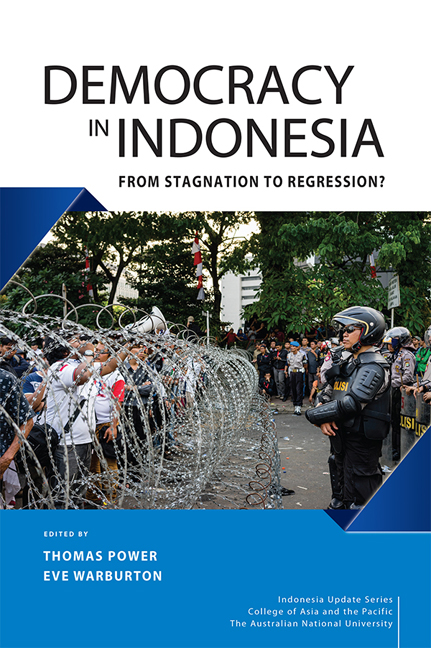Book contents
- Frontmatter
- Contents
- Tables and Figures
- Contributors
- Foreword
- Acknowledgments
- Glossary
- 1 The decline of Indonesian Democracy
- Part 1 Historic al and Comparative Perspectives
- Part 2 Polarisation and Populism
- Part 3 Popular Supp ort for Democracy
- Part 4 Democratic Institutions
- Part 5 Law, Security and Disorder
- Index
- Indonesia Update Series
1 - The decline of Indonesian Democracy
Published online by Cambridge University Press: 24 November 2020
- Frontmatter
- Contents
- Tables and Figures
- Contributors
- Foreword
- Acknowledgments
- Glossary
- 1 The decline of Indonesian Democracy
- Part 1 Historic al and Comparative Perspectives
- Part 2 Polarisation and Populism
- Part 3 Popular Supp ort for Democracy
- Part 4 Democratic Institutions
- Part 5 Law, Security and Disorder
- Index
- Indonesia Update Series
Summary
Indonesia should feature prominently in any global account of democratisation. In a few heady years after the 1998 collapse of Suharto's autocratic New Order, Indonesia was transformed from one of the world's last and largest bulwarks of Cold War authoritarianism into one of Asia's most vibrant democracies. The details of this transition are well known, but bear repeating: the withdrawal of the armed forces from politics; the liberalisation of the party system; free and competitive elections; the proliferation of independent media; legal and judicial reform; expanded space for civil society; and a vast decentralisation program that devolved political power to elected local leaders. These achievements were yet more remarkable given they took place in an ethnically and religiously diverse country struggling to recover from the ravages of the Asian financial crisis. During this time, Indonesia appeared a democratic outlier (Carothers 2009; Diamond 2008; Lussier 2016): a rare case of successful transition and consolidation, not only within Southeast Asia, but globally amid the ebbing of democracy's third wave (Huntington 1991) and the onset of the democratic recession (Diamond 2015; cf. Levitsky and Way 2015).
Yet two decades after the landmark elections of 1999, a different— and far more pessimistic—scholarly consensus is taking shape. Where political analysts once lauded Indonesia as a beacon of democracy in a troubled region, most now agree that its democracy is in decline (Aspinall and Mietzner 2019; Diprose et al. 2019; Hadiz 2017). Recent studies have drawn attention to deterioration across an array of indicators: populist mobilisations, growing intolerance and deepening sectarianism (Mietzner et al. 2018; Warburton and Aspinall 2019); increasingly dysfunctional electoral and representative institutions (Aspinall and Sukmajati 2016; Muhtadi 2019); the deterioration of civil liberties (Marta et al. 2019); and the executive's expansion of an authoritarian toolkit for suppressing opposition and curtailing criticism (Mietzner 2019; Power 2018).
In the early months of 2020, as we finalised this volume for publication, the COVID-19 pandemic was sweeping into Indonesia's population centres. The central government was struggling to contain the virus, the death toll was rising, and the administration's instructions on lockdowns and social distancing were being poorly articulated and unevenly implemented. The government proved far more proactive and capable, however, in clamping down on criticism of its response to the pandemic.
- Type
- Chapter
- Information
- Democracy in IndonesiaFrom Stagnation to Regression?, pp. 1 - 20Publisher: ISEAS–Yusof Ishak InstitutePrint publication year: 2020



